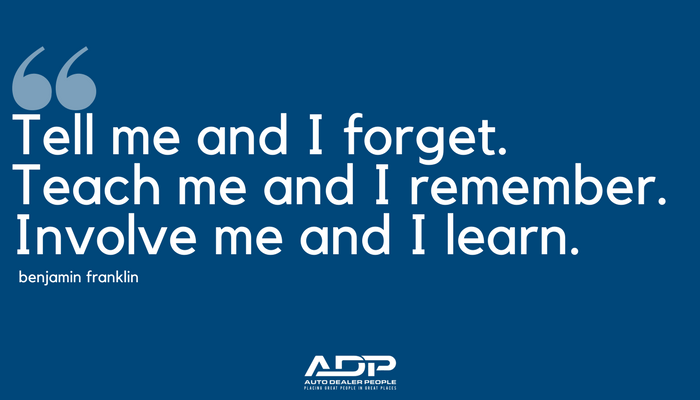Dealers call me to help them find a “great manager” – GM, GSM, Controller, Service Mgr. This is normally followed by, “I need them to be experienced in Automotive.”
I begin to ask questions about the position, duties, etc. and a few will interrupt me and begin to drill down to the crazy level. For example, “I want a Controller with x DMS experience, x franchise experience, x number of years’ experience, a CPA, and I don’t want to relocate them.” That’s when I pull out my fairy dust and they magically appear.
Seriously, when you create that type of wish list you will usually be disappointed, because you are focused on the wrong things and the applicant pool isn’t large enough. The dealer who wants all of that is looking for a complete plug and play because they don’t want to invest any time in the new hire. They aren’t willing to train, or even allow the employee to learn. If you aren’t willing to train your team, who are you relying on to train them? Their last employer?
I also get the client who tells me, “I want an experienced automotive GSM, but I don’t want them to be so old they don’t have any new ideas.” If they really want to twist me up, they ask for specific franchise experience.
Let’s skip the part where they just asked me to discriminate based on age, because I’m certainly not going to toss people because they are older than 40 – there’s a law against that. But what on earth made them think just because someone is older than x they won’t have any ideas? Ideas are often born from problems seen or anticipated and feeling as if you have power or influence to use them. New ideas come from people who are constantly learning and who search for solutions. How will you get or keep those people if you place no importance on learning in your store?
Tell me and I forget. Teach me and I remember. Involve me and I learn. -Benjamin Franklin
The solution in many stores is to simply force the training efforts off on an overtaxed manager who has not been trained to facilitate any training inside or outside the store, let alone conduct a Training Needs Analysis to develop a solid plan. Instead they rely on a hodge-podge of pseudo solutions – vendor webinars, online tutorials, videos and occasionally an outside trainer of some sorts.
I’m not discounting any of those, but each of them covers only a narrow spectrum of training needs which do not make sure that the right people have the right training. Operating a dealership that is complaint is complicated by itself, but each position must also execute a lot of additional skills.
Let’s just look at training needs for a typical salesperson as an example:
- Product knowledge.
- Cars and trucks, new and used, this isn’t just about engines and transmissions anymore. It’s about the electronics and options: How to help a client sync their phone, use navigation features or entertainment features.
- F&I product knowledge – What does your store warranty cover? What about the extended service contract options? When does GAP pay out?
- Communication skills, verbal and written. Your store may have an entirely different vibe and approach than the store they came from. Do they know how to answer the phone properly?
- The steps to the sale. Again, may be slightly different from their prior store.
- How about basic technology – How to send email, how to use the copy machine, phone system.
- How about the CRM software usage?
- VAuto or other appraisal tools for trade?
- Do they pull their own bureaus in your store? If so, they must know how to do that.
If you expect your new hire to know all of this, you create a significant barrier to enter automotive, thereby limiting your pool of candidates.
Conversely, if you expect your new hire to learn it all “on the job”, you create a long steep learning curve that is frustrating to the employee. This makes them much less productive than you want for a longer period than necessary.
Every day in dealerships sales teams conduct Customer Needs Analysis. You attempt to understand what the customer needs in a vehicle, as well as their resources to acquire that need. Follow along next week as I dig into a very specific portion of the Training Needs Analysis.

